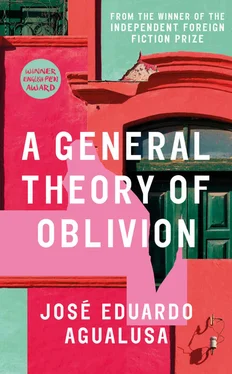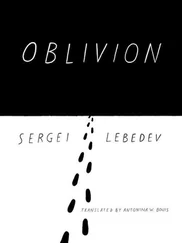The journalist pulled up a chair. He sat down.
‘Did you know a guy called Orlando Pereira dos Santos, a mining engineer?’
Gavião hesitated, very pale:
‘My cousin. First cousin. Did he die?’
‘I don’t know. Would you stand to gain anything from his death?’
‘The guy disappeared around Independence. They say he took a package of diamonds with him.’
‘You think he’d still remember you?’
‘We were friends. Spike’s silence in the early years didn’t surprise me. If I’d stolen a package of diamonds I’d want to be forgotten, too. He was forgotten. Everybody forgot him a long time ago. Why are you asking me these questions?’
The journalist showed him the letter from Maria da Piedade Lourenço. Gavião remembered Ludo. He’d always found her a bit distracted. Now he understood why. He remembered his visits to his cousin’s apartment, in the Prédio dos Invejados. The euphoria of those days before Independence.
‘If I’d known how it was going to end up, I’d have stayed in Paris.’
‘And what were you doing — there, in Paris?’
‘Nothing,’ sighed Gavião. ‘Nothing, like here. But at least I was doing it elegantly. I could be a flâneur .’
That same afternoon, after leaving the newspaper offices, Daniel walked up to Quinaxixe. The Prédio dos Invejados still looked pretty dilapidated. Nevertheless, the entrance hall was freshly painted, and the air was clean and cheerful. A security guard was posted at the elevator.
‘Does it work?’ asked the journalist.
The man smiled, proudly.
‘Almost always, boss, almost always!’
He asked Daniel for some identification and only then did he call the lift. The journalist got in. He went up to the eleventh floor. He got out. He paused a moment, struck by the cleanness of the walls and the shine on the floor tiles. There was only one door that jarred with the others, the door to apartment D. It was scratched and revealed a small hole, halfway up, that looked like a bullet wound. The journalist pressed the doorbell. He didn’t hear a sound. Then he knocked three times, hard. A boy came to the door. Big eyes, a mature expression surprising in someone so young.
‘Hello,’ the journalist greeted him. ‘Do you live here?’
‘Yes, sir, I do. Me and my grandma.’
‘Can I talk to your grandma?’
‘No.’
‘Let be, son, I’ll talk to him.’
Daniel heard the voice, fragile, cracked, and only then saw the very pale woman appear, dragging one leg, her grey hair parted into two thick braids.
‘I am Ludovica Fernandes, my good man. What do you want?’
The old man watched as January rose up and closed in around the Kuvale people like a trap. First the drought. A lot of oxen died. The further east they travelled, climbing the range of hills, the sweeter the air became, the ground getting cooler and softer. They found some pasture, muddy watering holes, and they walked on, struggling to decipher the faint hints of green. The fence just popped up by surprise, like an insult, offending the luminous hip of the morning. The herd came to a stop. The young men gathered in nervous groups, calling out sharply in surprise and indignation. António, the son, came over. He was sweating. His handsome face, with its straight nose, its prominent chin, was flushed through effort and rage:
‘What do we do now?’
The old man sat down. The fence ran for hundreds of metres. To the right it emerged from a harsh tangle of bramble bushes, which the locals called cat’s claws, and to the left it plunged into an even thicker, more sharply pointed nightmare of wild bushes, of long cacti in the shape of candelabra, and of mutiati trees. Beyond the barrier was a soft path of white pebbles, along which, at that time of year, a small brook was meant to be flowing.
Jeremias Carrasco selected a twig, smoothed out the sand, and began to write. António crouched beside him.
That afternoon they knocked down the fence and crossed to the other side. They found a bit of water. Good pastures. The wind began to blow. It carried heavy shadows along with it, as though it were carrying the night, in shreds, yanked away from some other, even more distant desert. They heard the sound of an engine and saw, appearing through the gloom and the dust, a jeep carrying six armed men. One of them, a skinny mulatto with the destitute look of a wet cat, leapt from the car and came towards them waving an AK-47 in his right hand.
He was shouting in Portuguese and Nkumbi. A few phrases, torn to pieces by the wind, reached Jeremias’s ears:
‘This is private land! Get out! Get out now!’
The old man raised his right hand, trying to hold back the momentum of the young men. Too late. A lanky young lad, who had only just taken a wife, and whom they called Zebra, threw a small assegai. The spear traced an elegant arc in the panicky sky and planted itself, with a dry crunch, just centimetres from the mulatto’s boots.
There was the briefest moment of silence. The very wind seemed to abate. Then the guard raised his gun and fired.
In the harsh light of midday it would have been a bloodbath. The six men were armed. Some of the shepherds had been in the military, and they too were carrying firearms. At that time, however, with the wind whipping through the darkness, only two bullets found their way into flesh. Zebra was lightly wounded in one arm. The mulatto in a leg. Both parties drew back, but in the confusion a lot of cows were left behind.
The following night, a group of young shepherds, led by Zebra, went back to the estate. They returned with some of the missing cattle, half a dozen cows that didn’t belong to them, and a fourteen-year-old boy, who, according to Zebra, had chased after them on horseback, shouting like a man possessed.
Jeremias was alarmed. Stealing cattle is tradition. It happens all the time. In this case, it was a kind of exchange. The kidnapping of the boy, though, that really could cause them some problems. The old man sent for him. He was an adolescent with very green eyes, untamed hair tied into a ponytail. One of those characters who in Angola are often called ‘lost frontiers’, because by daylight they look white, and at twilight they are discovered in fact to be part mulatto — from which it might be concluded that sometimes you can understand people better further away from the light. The boy looked at the old man with contempt:
‘My granddad is going to kill you!’
Jeremias laughed. He wrote in the sand:
I’ve died once before. Second time won’t be so bad.
The boy stammered something, surprised. He started to cry.
‘I’m André Ruço, senhor . I’m General Ruço’s grandson. Tell them not to hurt me. Let me go. Keep the cows but let me go.’
The old man made an effort to persuade the young ones to release André. They demanded their cows back and a guarantee that they could cross the estate in search of better pastures. They’d been at this for three days when Jeremias saw the past crouching down before him. It had aged, which doesn’t always happen — sometimes the past travels centuries without time corrupting it at all. Not this time: this man had withered even more, he had more wrinkles, and what hair he had left was practically colourless. His voice, though, remained solid and firm. At that moment, when Jeremias found himself faced with Monte, seeing him stand up and get pushed backwards, seeing him run off, chased by the young shepherds, he was reminded of Orlando Pereira dos Santos and his diamonds.
THE STRANGE DESTINY OF THE KUBANGO RIVER
Nasser Evangelista was pleased with his new job. He wore a blue uniform, very clean, and spent most of his time sitting at a desk, reading, while he watched the door out the corner of his eye. He had developed his taste for reading during the years he’d spent locked up in the São Paulo prison in Luanda. After his release, he’d worked as a craftsman, carving masks in the Mile-Eleven Market. One afternoon he met Little Chief, with whom he’d shared a cell, who invited him to work as a doorman at the Prédio dos Invejados at Quinaxixe, where the businessman had just moved in.
Читать дальше












